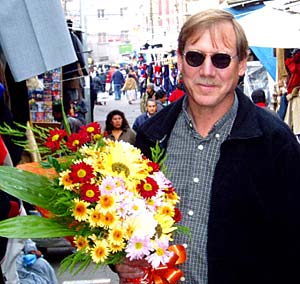
Kent Johnson
<![if !supportLineBreakNewLine]>
<![endif]>
After sending me the note I posted yesterday, Kent Johnson went on in a later email to muse the following:
What seems funny to me, frankly, is that the "non-mainstream" poetry world has produced exactly two books so far that stand as full and open responses to the war – Weinberger's and my own Lyric Poetry after Auschwitz.
To which he appended, in a later email, “That I've heard of, at least.”
All of which made me think about the nature of anti-war poetry itself. When I wrote directly of Weinberger’s dystopian epic, Eliot wrote to say that he’d never claimed to be a poet, and doesn’t claim What I Heard in Iraq to be a poem. But if it’s not a poem, it certainly is poem-like in many of its strategies, and many of its effects.
Today is the 40th anniversary of the composition of “Wichita Vortex Sutra II,” for my money the greatest anti-war poem of the Vietnam Wichita , Kansas
When “Wichita Vortex Sutra II” was created, the war – dating it from the Gulf of Tonkin U.S. Saigon . Roughly 85 percent of that conflict, at least from the U.S. vantage, still lay in the future, tens of thousands of American casualties yet to come, literally millions of Vietnamese (for whom the war was already well into its second decade in 1966).
When I think of anti-war poems & Vietnam Guernica Vietnam
Let me ask that question in a more difficult way: are The Pisan Cantos anti-war poems? They certainly do not appear to be pro-war poems as such. But it’s hard to imagine them as any other than as war poems – that is their field of engagement. They are, to borrow Johnson’s terms, “responses to the war.” Yet to concede even that is to suggest that some of the greatest poetry of the Second World War was penned by an enemy in a prisoner-of-war camp. If you exclude The Pisan Cantos as war poems, then it would seem to me you would have to exclude H.D.’s Trilogy, especially her work on the bombing of London The Walls Do Not Fall. Yet to include these works seems to me to move along a path that ineluctably leads to the idea that every poem by Paul Celan, for example, must be read/understood as a war poem.
This question really concerns the epistemological dimension of the poem, the degree to which any text can be said to be (or not be) about. That is an issue that has been fodder for a generation of theory now, and one can track writing’s bad conscience toward this relationship back even before Joyce demonstrated the slippery slope that leads more or less directly from ”The Dead” through Ulysses to Finnegans Wake. Poets approach this from more than a few different angles along that path – Duncan’s strategy in Passages, for example, of addressing the issue directly (albeit through a discussion of a painting, Piero di Cosimo’s painting “The Forest Fire”), as part of a far larger sweep of issues in the poem is not so dissimilar, frankly, from Pound’s own solution.
It’s interesting to think of who didn’t write a Vietnam War poem – virtually all of the New York School, Robert Creeley, Charles Olson – as it is to think of the degree to which this epistemological question lay at or near the heart of the breakup between Duncan & Denise Levertov – Duncan, the antiwar poet, taking a different position when confronted with the collapse of Levertov’s work from 1970 onward into so much reified politically correct scolding. A parallel discussion was going on, it should be noted, with regards to the poetry of Amiri Baraka, as many of his old pals among the New Americans were not so enchanted with his turn toward Maoism. Here, tho, the war was a more peripheral issue, tho I’m sure Baraka would have noted that it was hardly peripheral to black men, who were being wounded & killed in disproportionate numbers. And there was a third debate during that same period, involving Edward Dorn & the rejection of Black Mountain
It’s worth noting further, just because it’s the way Johnson posed the question, that neither “Sutra” nor Passages 13 were themselves books, tho “Sutra” was reprinted as a poster more than once and “The Fire” if I am not mistaken was first published by Poetry magazine (something that could not happen today with its current anti-modern regime). The closest thing I can come to as a book-length response poetically to the Vietnam war by a major poet of that period is Di Prima’s Revolutionary Letters, just possibly the most embarrassing book ever penned by any of the New Americans, filled with romantic fantasies of what it would be like to be a “real” revolutionary. Dedicated, no less, to Bob Dylan, self-admitted fan of Barry Goldwater that he was.
So I’m not so surprised that more such works don’t now exist – nor for that matter do I think that it means that the current generation of post-avant poets are politically quietist any more than I think the absence of similar writing by Robert Creeley, say, ever meant that he wasn’t utterly appalled and sickened by the brutality & stupidity that was our imperial adventure in Southeast Asia. The issue is much more complicated than this. What is really sad & sick is that, 40 years after “Wichita Vortex Sutra II,” this whole question comes back to haunt us:
Three five zero zero is numerals
Headline language poetry, nine decades after Democratic Vistas
and the Prophecy of the Good Gray Poet
Our nation “of the fabled damned”
or else . . .
Language, language
Ezra Pound the Chinese Written Character for truth
defined as man standing by his word
Word picture: forked creature
Man





